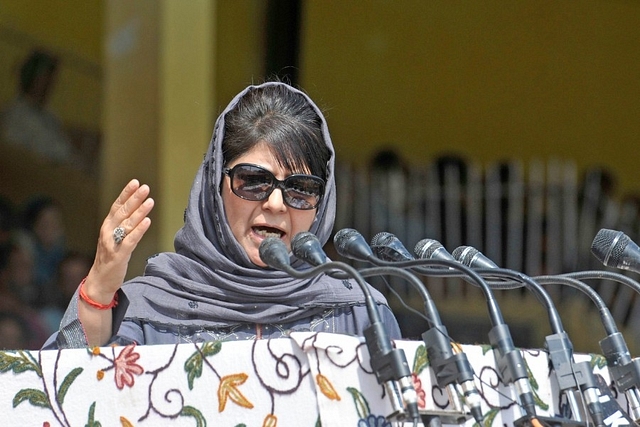
BJP Must Dump Mufti, Re-Embrace Abolition Of Articles 370 And 35A
Articles 35A and 370 are now under challenge in the Supreme Court of India.
Here’s why the BJP should use this opportunity to get back to its old position on both.
The video of a Central Reserve Police Force (CRPF) van being attacked by violent mobs, and the one where an army major tied a Kashmiri local to his jeep to take election officials to safety last year, are enduring images of where we stand vis-a-vis Islamist Kashmir Valley.
The CRPF van’s driver rightly decided that stopping the vehicle to prevent casualties would have meant allowing themselves to be lynched and possibly killed. Instead, by not stopping, he ran over one of the mobsters, killing him. We can shed crocodile tears over the dead man, but anyone who attacks the law’s guardians is essentially asking for it.
What these two images reveal is an Indian state under siege in Kashmir Valley, and since this has intermittently been the case for more than three-and-a-half decades now – starting with the Pandit exodus in the late 1980s – we need to re-examine our fundamental positions on Jammu and Kashmir (J&K). We are essentially in an Israel-Palestine kind of situation, but in reverse: it is the Kashmiris who have reduced half a million Indians to refugees in their own land. And it is the Indian state that is treading gingerly on all the sensitivities of Kashmiri Muslims, as evidenced even by the offer of an unwarranted ceasefire during the current Ramzan period.
We have handled Kashmir with kid gloves since 1948; we have done almost nothing to change demography or reduce the local population to a cipher, as the Chinese have done in Tibet and Xinjiang and the Israelis in Palestine. In short, we have played more than fair.
The Bharatiya Janata Party (BJP), for its part, has abandoned its key ideological positions on J&K, especially the abrogation of Article 370, which gives the state its special status. The demand was always logical, but is now almost a dead letter: the party agreed to set it aside in 1998 in order to rule Delhi; now it appears to have abandoned it entirely since it is sharing power in Srinagar. Soft-pedalling on Article 370 has been justified as a way of giving Kashmiris time to realise the benefits of Indian secularism and become full Indian citizens. What we have actually ended up with is the opposite: Article 370 has become the base negotiating position from which to demand full or near-full “azadi”.
Even worse, there is Article 35A, which gives the state legislature the right to decide who is a permanent resident, and offer him special benefits in terms of public sector jobs, property ownership and access to welfare schemes. This article was inserted illegally in the Constitution by Jawaharlal Nehru, who got president Rajendra Prasad to amend the Constitution through fiat instead of getting this passed through Parliament.
Articles 35A and 370 are now under challenge in the Supreme Court, and the BJP should use this opportunity to get back to its old position on both.
There is a case for greater devolution of power to all states in the Indian Union, but no case whatsoever for the retention of Article 370. Not when J&K is seeking to separate itself repeatedly from the Indian Union, and the local parties are in bed with the separatists, either overtly or covertly. It is a real tragedy when the BJP partners the Peoples Democratic Party in Srinagar at a time when mobs are attacking every symbol of the Indian state, and Chief Minister Mehbooba Mufti repeatedly calls for talks with Pakistan and the separatists.
If the BJP has joined the government in Srinagar in order to encourage this separatist thought-process, it should now consider itself to be on the borderline of becoming anti-national itself.
It is foolish to expect Mufti to change colours, especially when her party leaders – even the saner elements – are fearful of being bumped off by jihadi elements. It will not be able to speak up for India until this fear of jihadis is ended, and this can’t end as long as the BJP supports her and allows her to espouse soft separatism. When the Khalistanis ruled the streets of Punjab, the Akalis could never speak for India. It’s the same with Mufti.
The right course for the BJP to adopt now is the following:
First, suspend the J&K assembly and allow the army and the security forces to restore law and order before any kind of talks begin with parties willing to work within the Indian Union.
Second, renew the call for the abolition of Article 370. While this needs support in both houses of Parliament, giving up the demand prematurely has defanged the BJP, making it toothless. The article must go, and even if there is no parliamentary support, it must always be a BJP demand. At some point, it will be possible to abolish it along with measures to devolve more powers to all states.
Third, Article 35A must certainly go, as it is illegal. The BJP must take a formal stand on its abolition, and campaign for the rights of other Indian citizens to reside and acquire property in J&K. We cannot forever have a one-sided policy where Kashmiris can settle anywhere, but non-Kashmiris can only be second-class citizens in J&K.
The battle between security forces and the separatists and jihadis will only get fiercer from now on. The last thing we need is to allow Mufti to tie their hands. The Indian state cannot be begging to be accepted in the valley. It is time to tell the Kashmiris to like it or lump it. The Indian state must demonstrate the will to take on all militants and locals who want to challenge it.
There can be no peace without victory against the terrorists and violent mobs.